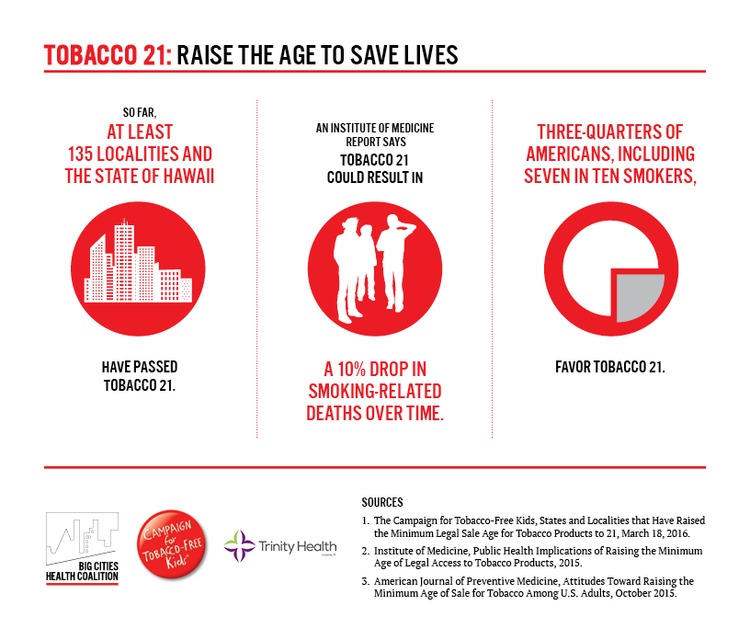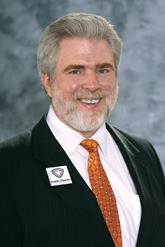Frontline Blog
How Did Tobacco 21 Pass in Kansas City? With a Unique Coalition.
April 2016
The Big Cities Health Coalition held a Congressional Briefing today on Tobacco 21 that discussed the momentum around passing Tobacco 21 legislation, or raising the age of tobacco sale from 18 years old to 21. So far, 135 localities from nine states have passed the legislation. We asked Rex D. Archer, MD, MPH, Director of Health in Kansas City, to tell us how local stakeholders forged a diverse coalition to support and pass Tobacco 21 legislation in Kansas City.

Rex D. Archer, MD, MPH
Director of Health
Kansas City, Missouri, Health Department

The movement to raise the age of sale of tobacco products to 21 in Kansas City is a tale of collaboration, casting, and finding the best messengers. It’s about telling the right story at the right time.
Tobacco 21, or “T21,” is about raising the age of sale from 18 to 21 years of age and has been around for at least ten years. From a health point of view, making the case is relatively easy. Since 95% of smokers start by the age of 21, this policy stops a harmful addictive behavior before it even starts. It may be more legally complicated in your community, but in most places, it can be passed with a simple ordinance. What made our effort in Kansas City different was the makeup and leadership of our Tobacco 21 campaign team, which included hundreds of members of the business community, legislative bodies, public health officials, and local youth. The synergy of this group helped move Kansas City to pass T21.
T21 was on the radar of the Tobacco Use Reduction committee of the Kansas City Health Commission, but had not seen a lot of movement. T21 was included in our Community Health Improvement Plan, but faced certain roadblocks, such as preemption at the state level, and competing priorities, such as a focus on other emerging tobacco issues. So the effort moved slowly at first. Members of the health department staff and committee met with elected officials about T21. Then, health department staff provided technical assistance and helped draft a T21 ordinance, but it remained on a councilman’s desk, waiting for the right time and just the right push. What we needed were diverse partners from non-public health sectors to reach critical mass.
Around the same time, The Greater Kansas City Chamber of Commerce began an innovative “Healthy KC” initiative with Blue Cross and Blue Shield of Kansas City. Businesses, economic development stakeholders, employers, and regional health and wellness leaders came together to advocate for real solutions to create a culture of health in Kansas City. Action teams were created to research issues and make recommendations on how we could achieve our goals of a healthier KC. T21 rose to become the first strategy that could be implemented.
Our coalition and outreach grew. We found allies. Some of the team members were also on the Tobacco Use Reduction Committee of the Health Commission, and having Healthy KC as a convener had a welcome effect – working in tandem with that group was key to our success. Leaders like Scott Hall, Vice President of Strategic Initiatives for the Greater Kansas City Chamber of Commerce and Jessica Hembree, Policy Officer for the Health Care Foundation of Greater Kansas City, were able to bring new organizations and members to the table. These new members were able to achieve the critical mass needed to move the draft legislation, reach elected officials, and implement strategies to engage new partners and tell as many individual stories as possible.
“In T21, each of us played a role,” said Hall. “Having the technical support of health departments, as well as their ability to have different types of conversations internally with elected officials, allowed us to pass the torch to other team members and keep the momentum toward policy change going.”
By having the business community and foundations lead the charge, it shifted the conversation from focusing solely on the individual health aspects, to emphasizing the collective cost of employing smokers and why it makes sense from a business standpoint to ensure a healthier workforce.
“Our experience provides lessons learned for collaborating across the business, nonprofit and public health sectors,” said Hembree. “T21 is just the start of our continued partnership on a variety of public health policy strategies to improve the health of KC.
Here are a few quick lessons from our experience enacting T21:
· Assess community readiness.
A few key conversations with area health departments and a sample of policymakers can give you a good sense about whether or not your community is supportive of T21. Do your homework to make sure you have a chance at success before going public.
· Approach the business community.
Chambers of Commerce and businesses throughout the KC metro area spoke out in favor of Tobacco 21. Having local business leaders engaged made a difference.
· Learn from other communities.
Tap the experts in your community who were part of previous tobacco efforts, particularly those from the smoke-free air movement. Knowing what worked or didn’t work on local smoke-free campaigns was valuable.
· Lay the groundwork.
Be sure you’ve done your homework so that when Tobacco21 becomes a topic of public and political conversation, you have a long list of supporters and a strategy for moving forward. KC had well over 100 endorsers before we formally launched our campaign.
· Keep it simple.
It is a relatively small change that is cost-neutral. Don’t overcomplicate the policy or your messaging.
· Be in control of your message throughout the process.
Launch your earned media effort once you feel you have sufficient support to back you up. Have spokespeople available for the media at every step along the way, clear through to the day of the vote and even during the implementation phase. Have key messages and stick to them.
· Find your champions and listen!
The right champion can be your personal tour guide through the policymaking process. A champion with the right leadership skills and political savviness is critical. In some communities, policymakers want to see a flood of support, and in others, the pressure is intimidating and makes the issue more controversial.
· Ask your elected officials where they stand…don’t make any assumptions.
Tobacco21 policies are nonpartisan and support can come from unexpected places. Don’t assume you know any elected official’s position until you’ve actually talked with them. Assign someone from your effort to speak to each elected official. Ideally, this person will have an established relationship or some other connection to the policymaker. These conversations are a critical.
· Localize the issue.
Factsheets, statistics, who provides testimony before the council, and who endorses should all be as local as possible.
· The voices of young people matter.
Young people will stand to benefit most from Tobacco21 policies, so placing their voices at the forefront is critical, including when media call for interviews.